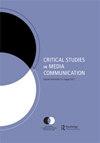《玛丽·波平斯辞职》中的粉丝公民权:粉丝效应、公众效应和团结的潜力
IF 1.5
2区 文学
Q3 COMMUNICATION
引用次数: 0
摘要
2014年7月23日,为纪念迪士尼电影《欢乐满人间》上映50周年,《欢乐满人间》发布了一段名为《欢乐满人间》的视频,点击量超过400万。在视频中,玛丽·波平斯一边唱着“一勺糖”的曲调,一边呼吁提高联邦最低工资。要理解像“玛丽·波平斯辞职”这样以粉丝为基础的公民表演,就需要理解流行文化、粉丝和公民之间的影响是如何移动的。我认为,玛丽·波平斯是一个在粉丝之间传递情感的人物,她呼吁粉丝们用对待玛丽·波平斯的情感取向来对待最低工资工人。为了证明这一观点,我借鉴了粉丝研究和修辞研究的成果来定义粉丝情感和公众情感。转到我对“玛丽·波平斯辞职”视频的分析,我认为视频通过名人的角色产生了影响,破坏了“价值”话语的稳定,这种话语通常将最低工资的工人视为不值得更高的工资,并要求人们对自己的同胞有新的定位。最后,我认为将影响从流行文化对象转移到公共领域为团结提供了新的机会,但也有局限性。本文章由计算机程序翻译,如有差异,请以英文原文为准。
Fan-Based citizenship in “Mary Poppins Quits”: fannish affect, public affect, and the potential for solidarity
ABSTRACT On July 23, 2014, the fiftieth anniversary of Disney’s Mary Poppins, Funny or Die released a video titled, “Mary Poppins Quits with Kristen Bell,” earning more than 4 million views. In the video, Mary Poppins sings to the tune of “A Spoonful of Sugar” while calling for an increase to the federal minimum wage. Understanding fan-based citizenship performances like “Mary Poppins Quits” requires understanding how affect moves between popular culture, fans, and citizens. I argue that Mary Poppins functions as a figure that conducts affect across and between fan-citizens, calling on fans to treat minimum wage workers through the same affective orientation with which they treat Mary Poppins. To make this argument, I draw on work in fan studies and rhetorical studies to define fannish affect and public affect. Turning to my analysis of the “Mary Poppins Quits” video, I argue the video conducts affect through celebrity personae, destabilizes the “worthiness” discourse that often frames minimum wage workers as unworthy of a higher wage, and demands new orientations to one’s fellow citizens. Ultimately, I argue that moving affect from popular culture objects to the public sphere opens up new opportunities for solidarity but carries limitations as well.
求助全文
通过发布文献求助,成功后即可免费获取论文全文。
去求助
来源期刊

Critical Studies in Media Communication
COMMUNICATION-
CiteScore
2.10
自引率
0.00%
发文量
34
期刊介绍:
Critical Studies in Media Communication (CSMC) is a peer-reviewed publication of the National Communication Association. CSMC publishes original scholarship in mediated and mass communication from a cultural studies and/or critical perspective. It particularly welcomes submissions that enrich debates among various critical traditions, methodological and analytical approaches, and theoretical standpoints. CSMC takes an inclusive view of media and welcomes scholarship on topics such as • media audiences • representations • institutions • digital technologies • social media • gaming • professional practices and ethics • production studies • media history • political economy. CSMC publishes scholarship about media audiences, representations, institutions, technologies, and professional practices. It includes work in history, political economy, critical philosophy, race and feminist theorizing, rhetorical and media criticism, and literary theory. It takes an inclusive view of media, including newspapers, magazines and other forms of print, cable, radio, television, film, and new media technologies such as the Internet.
 求助内容:
求助内容: 应助结果提醒方式:
应助结果提醒方式:


